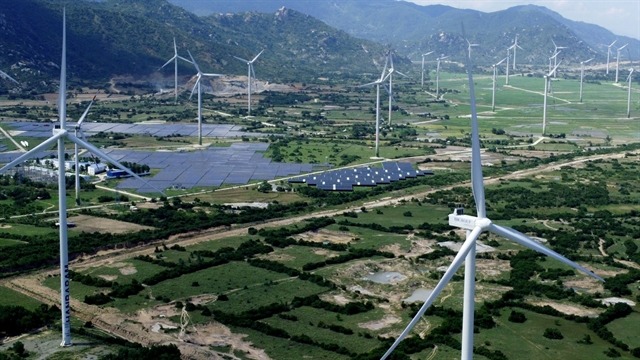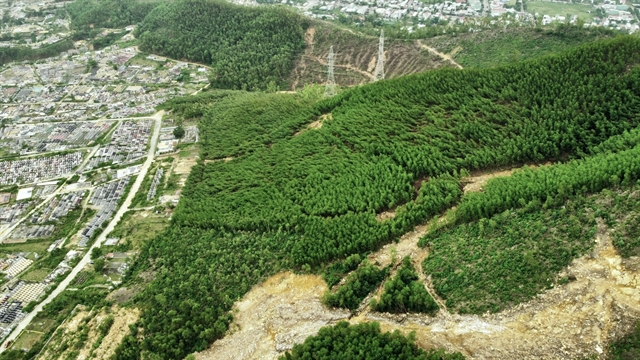Vietnam among ASEAN leaders in green transition
In the midst of an ongoing global shift towards sustainability, Vietnam has emerged as one of regional leaders in Southeast Asia's green economy transition.
This leadership is not just about setting ambitious goals, but also about demonstrating measurable progress.

A pole in the circuit-3 500kV Quang Trach-Pho Noi line being erected. The transmission line is expected to go operational by the end of June to ensure power supply for the north this year and beyond. Photo by Vietnam News.
The Southeast Asia’s Green Economy 2024 report, recently released by Bain & Company, GenZero, Standard Chartered and Temasek, underscores Vietnam's advancements, highlighting the nation's leap in the green economy index.
Vietnam climbed five places on the index, reflecting substantial improvements to its roadmap for a green economy. This is testament to the country's commitment to bridging the gap between green aspirations and actual progress.
At the heart of Vietnam's green agenda lie robust commitments.
The nation has set ambitious climate targets, including a non-binding net-zero goal by 2050, with a 2030 emissions target of 781 metric tonnes of carbon dioxide equivalent, up from 458 in 2020.
Vietnam's progress includes expanding forest land, reducing emissions per capita to 4.7 tonnes, achieving 43% renewable energy in power generation, attaining 3% battery EV sales, and curbing tree loss by 14%.
To accelerate this transition, several mechanisms are in place.
The Power Development Plan VIII (PDP8), introduced in May 2023, outlines a comprehensive strategy to phase out coal by 2050, while significantly increasing the contribution of solar, wind and hydroelectric power to the national grid.
Another critical component of Vietnam's strategy is the Just Energy Transition Partnership (JETP), which plans to draw $15.5 billion in investment. This partnership emphasises the importance of public-private collaboration in accelerating the green transition.
Additionally, the country is developing carbon pricing instruments and an Emissions Trading System, slated to become operational by 2028. This initiative, led by the Department of Climate Change under the Ministry of Natural Resources and Environment, is a critical step towards reducing greenhouse gas emissions and creating a market-driven approach to carbon reduction.
Emissions reporting is currently mandatory for all sectors, but there's a lack of a permitting process for renewable energy. Vietnam also lacks a carbon market registry and voluntary carbon market standards. Initiatives like developing a carbon tax and incentives for EVs, solar power, and green buildings are underway, yet challenges persist in attracting sufficient private investments.
Despite requiring a capital investment of $34 billion for its green transition, Vietnam secured only $200 million in private investments in 2023.

An acacia plantation in Hoa Vang district, Danang. The city is considering planting native forest trees as part of Vietnam's afforestation efforts. Photo by Vietnam News.
Vietnam experienced a dramatic 79% decline in private green investments in 2023. This drop is largely attributed to delays in executing major national roadmaps and the high cost of capital, which ranges from 10% to 12%. This financial strain underscores the urgent need for timely policy implementation and the creation of a favourable investment environment.
Regulatory uncertainties further complicate the situation. Delays in the implementation of key policies such as PDP8 and JETP have hindered large-scale investments. Additionally, Vietnam provides fewer financial incentives and subsidies for decarbonisation compared to other regions. This lack of support affects corporate willingness to invest in green technologies.
In response to these challenges, Vietnam is making strategic adjustments. The country is updating its feed-in tariffs for wind and solar projects and offering incentives for EVs and green building construction.
The Ministry of Planning and Investment is also spearheading an initiative to transform 563 industrial parks into eco-friendly zones by 2030. This move aims to engage companies focused on decarbonisation and to create sustainable industrial hubs.
Additionally, in 2023, Vietnam launched its first voluntary carbon exchange, marking a key step in its carbon reduction efforts. By 2025, the country plans to pilot a comprehensive carbon exchange system to create a robust platform for carbon trading, enhancing its ability to meet emission targets and foster a carbon credit market.
Vietnam’s progress compared to ASEAN peers.
Singapore leads the way with a robust sustainability framework, including a carbon tax and strong incentives for green technologies. It climbed four spots on the green economy index.
Thailand has made notable progress in solar power but faces similar regulatory and financial obstacles. Indonesia and Malaysia have seen mixed progress, dealing with regulatory ambiguity and high capital costs, each moving up by two spots on the index.
The region is faced with a significant investment gap, requiring $1.5 trillion to finance its green transition by 2030. Urgent collective action from governments, corporations, and investors is essential. Standardising regulations, mitigating investment risks, and fostering a conducive environment for green investments through regional collaboration are crucial.
Southeast Asia's success in its green transition relies on collective efforts to embrace commercially viable green technologies, while unlocking economic benefits for a sustainable and prosperous future.
- Read More
Vingroup plans $38 mln bond issuance to restructure debt
Vingroup (HoSE: VIC), Vietnam’s largest listed company by market cap, plans to issue VND1 trillion ($37.91 million) in bonds via private placement as it seeks to restructure debt.
Companies - Tue, November 25, 2025 | 3:52 pm GMT+7
Vietnam gov't proposes minimum $379 mln charter capital for offshore wind developers
The Vietnamese government has proposed that offshore wind power developers have a minimum charter capital of VND10 trillion ($379 million) each, according to a draft resolution designed to ease bottlenecks in the country’s 2026-2030 energy development plan.
Energy - Tue, November 25, 2025 | 3:41 pm GMT+7
Petrovietnam arm to venture into CO2 transportation, seabed minerals, geothermal
PVEP, the upstream arm of state giant Petrovietnam, plans to expand into new fields such as CO2 transportation and disposal (carbon capture, utilization, and storage), coal gas and underground mineral research, seabed minerals, and geothermal.
Industries - Tue, November 25, 2025 | 3:08 pm GMT+7
MB successfully closes landmark $500 mln inaugural green term loan facility agreement
Military Commercial Joint Stock Bank (MB) on Monday announced the successful closing of its three-year $500 million inaugural Green Term Loan Facility Agreement, marking a significant milestone in the bank’s sustainable financing journey.
Banking - Tue, November 25, 2025 | 2:17 pm GMT+7
Impact of rising exchange rates in Vietnam
Mirae Asset Securities analysts offer an insight into the impact of rising exchange rates on companies in Vietnam in a report dated November 21.
Economy - Tue, November 25, 2025 | 1:35 pm GMT+7
Vietnam's industrial park developers post strong earnings as tenant demand rebounds
Vietnam’s industrial real estate sector is showing stronger earnings and improving demand, with foreign tenants resuming lease negotiations after U.S. tariff policies became clearer, according to a brokerage report.
Industrial real estate - Tue, November 25, 2025 | 11:07 am GMT+7
Vietnamese export stocks under the radar despite strong earnings
Investor caution over tariff risks and the slowdown of major economies has prevented Vietnamese export stocks from making a strong price recovery.
Finance - Tue, November 25, 2025 | 8:44 am GMT+7
Indonesia plans 7 initial waste-to-energy plants next year
Indonesia will start the construction of seven waste-to-energy power plants in 2026 as the first step to develop 33 such facilities by 2029.
Southeast Asia - Mon, November 24, 2025 | 9:23 pm GMT+7
Malaysia predicted to be ASEAN’s second-fastest-growing economy, after Vietnam
Malaysia is poised to become the second-fastest-growing economy in the Association of Southeast Asian Nations (ASEAN) after Vietnam, data showed.
Southeast Asia - Mon, November 24, 2025 | 9:19 pm GMT+7
Thailand SCG-backed Bien Hoa Packaging plans delisting from HCMC bourse
Bien Hoa Packaging JSC, a 57-year-old manufacturer in Vietnam, plans to scrap its public-company status and delist from the Ho Chi Minh Stock Exchange (HoSE) as its free float fell below the minimum threshold under local securities law.
Companies - Mon, November 24, 2025 | 9:06 pm GMT+7
Real estate, industrials sectors lead in October M&A value in Vietnam
Grant Thornton analysts provide an insight to capital flows, the sectors attracting investor attention, and the market dynamics influencing the merger and acquisition (M&A) landscape in Vietnam in October.
Economy - Mon, November 24, 2025 | 4:39 pm GMT+7
Tobacco giant Vinataba to sell entire stake in instant noodle maker Colusa-Miliket
State-owned Vietnam National Tobacco Corporation (Vinataba) plans to divest its entire 20% stake in Colusa-Miliket, the company behind the iconic “Miliket” (two-shrimp) instant noodle brand, seeking to raise at least VND114 billion ($4.32 million).
Companies - Mon, November 24, 2025 | 4:10 pm GMT+7
VinSpeed cannot participate in North-South high-speed rail project under PPP model: exec
Pham Nhat Vuong, founder of VinSpeed High-Speed Rail Investment and Development JSC, has mapped out a clear 30-year financing plan for the gigantic North-South high-speed rail project, said an executive at Vingroup, a VinSpeed investor.
Infrastructure - Mon, November 24, 2025 | 3:51 pm GMT+7
Delivery major Viettel Post plans $21 mln logistics center in central Vietnam
Viettel Post, the courier arm of military-run telecom giant Viettel, has completed a site survey for a planned 21-hectare logistics center in the central province of Ha Tinh, with an estimated investment of nearly VND550 billion ($20.87 million).
Industries - Mon, November 24, 2025 | 11:49 am GMT+7
Honda Mobilityland eyes 600-ha sports, entertainment, tourism complex in southern Vietnam
Honda Mobilityland Corporation, a subsidiary of Japan’s Honda Motor Co., plans to build an international circuit in Tay Ninh province, towards developing a 600-hectare sports, entertainment, and tourism complex there.
Industries - Mon, November 24, 2025 | 11:23 am GMT+7
State-controlled shipping line Vosco steps up coal trading to seek new revenue drive
Vietnam Ocean Shipping JSC (Vosco), controlled by the state-run Vietnam Maritime Corporation, is moving deeper into coal trading as the shipping line increasingly bids for large import contracts for thermal power plants, marking a push beyond its core maritime transport business.
Companies - Mon, November 24, 2025 | 8:36 am GMT+7






















